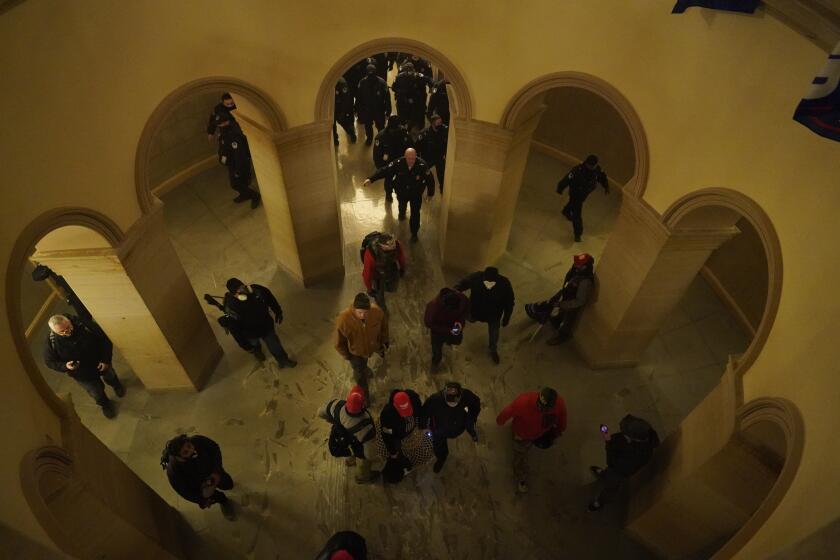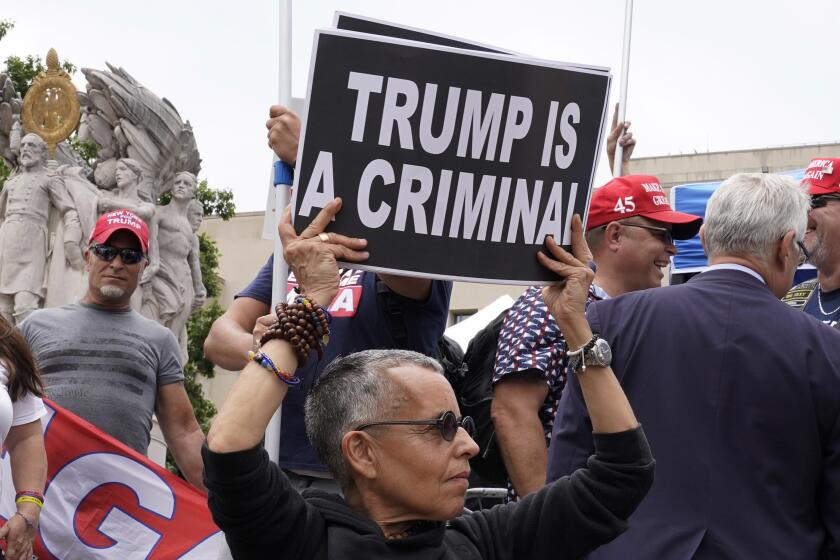Column: Two conservative scholars say the case isn’t close — the Constitution bars Trump from running again

Forget for a moment the indictments against Donald Trump, including the latest from Georgia, and about what impact they might have on his presidential candidacy. Consider instead this constitutional fact: Trump, as insurrectionist in chief, should be disqualified from office, and from being a candidate in the first place.
I’ve been nursing this opinion since Trump announced his 2024 campaign for president in November. But don’t take it from me. Two esteemed conservative scholars of constitutional law, both active members of the Federalist Society, have drafted a beefy legal treatise holding that “the case is not even close”: The former president, the Republican Party’s front-runner, is disqualified under a provision of the post-Civil War 14th Amendment that bars from state and federal office those who, having previously taken an oath of office to support the Constitution, participate in an insurrection or give support to insurrectionists.
Opinion Columnist
Jackie Calmes
Jackie Calmes brings a critical eye to the national political scene. She has decades of experience covering the White House and Congress.
“The bottom line is that Donald Trump both ‘engaged in’ ‘insurrection or rebellion’ and gave ‘aid or comfort’ to others engaging in such conduct, within the original meaning of those terms as employed in Section 3 of the 14th Amendment,” law professors William Baude, of the University of Chicago, and Michael Stokes Paulsen, of the University of St. Thomas, concluded in their paper, to be published next year in the University of Pennsylvania Law Review.
“All who are committed to the Constitution should take note and say so.”
Yes, let’s. As Baude and Paulsen put it: “There is a list of candidates and officials who must face judgment under Section 3” — a roster that could include Republicans in Congress and in state governments. “Former president Donald Trump is at the top of that list.”
The 14th Amendment says you can’t hold office and participate in insurrection, but applying it in Congress wouldn’t be easy.
Indeed. The evidence amassed last year in the hearings and final report of the House Jan. 6 committee established that Trump ran afoul of the Constitution’s disqualification clause, to wit:
Lying from election day to the present that victory was stolen from him. Coercing Republican state officials, Justice Department appointees and then-Vice President Mike Pence to throw out Joe Biden’s votes. Encouraging fake presidential electors. Summoning supporters to a “wild” rally to pressure Congress and Pence not to certify Biden’s election on Jan. 6, 2021. Telling them to “fight like hell.” Failing to intervene for three hours while they ravaged the Capitol, stopped the certification and threatened the lives of Pence and lawmakers. Providing “aid and comfort” to the insurrectionists, as captured by his noxious video that evening professing his love for them and, more recently, by his promises to pardon them once he’s reelected.
Oh, and nearly a year into Biden’s presidency, calling for “termination” of the Constitution he once swore to uphold, so he could be reinstalled in the White House. (Imagine him actually being reelected, and taking the oath again — lying right off the bat.)
Still, Baude told the New York Times that he and Paulsen initially had no opinion when they decided to examine the question of whether Trump should be disqualified.
President Biden is not weaponizing the law against Trump. The former president has always used wealth and connections to skirt accountability — that’s the real perversion of justice.
“We thought: ‘We’re constitutional scholars, and this is an important constitutional question. We ought to figure out what’s really going on here.’ And the more we dug into it,” he said, “the more we realized that we had something to add.”
What they added were 126 pages of airtight argument, from a conservative, originalist perspective, for the case to disqualify Trump. Federalist Society co-founder Steven G. Calabresi lauded it as “a tour de force.”
Yet making that case and enforcing it are two separate things. As a like-minded constitutional expert, Mark A. Graber, wrote in an earlier and shorter dive into Section 3, “The only question that remains is whether — and how — that will happen.”
Baude and Paulsen say the enforcers should be “anyone whose job it is to figure out whether someone is legally qualified” to hold office and to be included on state ballots — that is, state election administrators, typically the secretaries of state.
The former president’s “knowingly false claims” eroded the public trust in voting. The Aug. 1 indictment lays it out and a new poll underlines it.
Well, OK, but that’s easier said than done. Given the decentralized, state-by-state administration of elections and the nation’s polarization, you can imagine officials in blue states like California being receptive to challenges to Trump’s name on the ballot, while those in states that are MAGA-hat red would give such actions the back of their hand. Baude and Paulsen do not address the chaos that our red/blue divide could bring on.
Citizens for Responsibility and Ethics in Washington, a good-government group, has said since Trump’s November announcement that it would contest his candidacy based on Section 3. In a 90-page paper last month, CREW wrote that Trump “is the living embodiment of the threat that the 14th Amendment’s framers sought to protect American democracy against when they barred constitutional oath-breakers from office.”
Trump’s free speech rights don’t shield him from prosecution for allegedly trying to overturn the 2020 election results. The issue is his actions, not his words.
CREW even provides precedent: It succeeded last year in persuading a state judge to remove from office a New Mexico county commissioner, Couy Griffin, for his role in the Jan. 6 insurrection based on Section 3.
Yet CREW also hasn’t made clear exactly how Trump’s disqualification can be enforced. The organization’s spokesman would only tell me: “We are working on a legal challenge now that we’ll file at the appropriate time.”
Let the Constitution’s protectors loose. Bring on the battle. Yes, this is uncharted ground but so too is the place we find ourselves: with an ex-president, the first to reject the voters’ will and the peaceful transfer of power, now seeking a return to the highest office.
The courts can settle the matter — though I shudder at the thought that the Supreme Court could be the ultimate decider. After all, 23 years ago, a much less conservative court than today’s put George W. Bush in the White House.
More to Read
A cure for the common opinion
Get thought-provoking perspectives with our weekly newsletter.
You may occasionally receive promotional content from the Los Angeles Times.
















